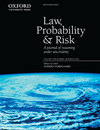投稿信息
稿件收录要求
Examples include: evaluation, interpretation and presentation of evidence, estimation of compensation for serious injuries, the relevance and reliability of genetic tests for insurance purposes with consequent considerations of legal or quasi-legal criteria for allowable discrimination; legal conflicts affecting the efficiency of credit scoring on the basis of the different types of data permitted to be held by credit bureaux in the U.K., the U.S. and the rest of Europe; the detection of fraudulent transactions live, using expert systems and statistical analyses; the drafting of legislation which is scientifically sound through the involvement of scientists and statisticians at this stage of legislation.
Non-evidence law topics include environmental issues, mass torts, causation, risk assessment, medical and pharmaceutical litigation involving the evaluation of epidemiological and bio-statistical evidence according to legal criteria.
The primary objective of the journal is to cover issues in law, which have a scientific element, with an emphasis on statistical and probabilistic issues and the assessment of risk.
Examples of topics which may be covered include communications law, computers and the law, environmental law, law and medicine, regulatory law for science and technology, identification problems (such as DNA but including other materials), sampling issues (drugs, computer pornography, fraud), offender profiling, credit scoring, risk assessment, the role of statistics and probability in drafting legislation, the assessment of competing theories of evidence (possibly with a view to forming an optimal combination of them). In addition, a whole new area is emerging in the application of computers to medicine and other safety-critical areas. New legislation is required to define the responsibility of computer experts who develop software for tackling these safety-critical problems.
Manuscripts may be submitted electronically using Microsoft Word, Wordperfect, LaTeX or on paper, in which case the original and three copies should be submitted. In either case (paper or electronic submission) before a paper is finally accepted, a signed letter from the corresponding author is required specifying the name, full mailing address and telephone/fax numbers and e-mail address of the person who will act as corresponding author. The covering letter should also specify, if applicable, information about possible duplicate publication problems, financial or other relationships that could give rise to conflicts of interest and any other information the editors may need to make an informed decision in accordance with established policies and practices.
Manuscripts may be submitted to any one of the six editors:
1. Prof. J. Gastwirth, Department of Statistics, George Washington University, Washington, DC, 20052, USA. Tel: 202 994 6356; Fax: 202 994 6917; E-mail: jlgast@gwu.edu
2. Prof. C. G. G. Aitken, School of Mathematics, The King''s Buildings, The University of Edinburgh, Mayfield Road, Edinburgh EH9 3JZ, UK. Tel: +44 (0) 131 650 4877; Fax: +44 (0) 131 650 6553; E-mail: C.G.G.Aitken@ed.ac.uk
3. Prof. J. Franklin, School of Mathematics, University of New South Wales, Sydney 2052, Australia. Tel: +61 2 93857093; Fax: +61 2 93857123; E-mail: jim@maths.unsw.edu.au
4. Prof. J. J. Koehler, Northwestern University School of Law, Chicago, IL 60611-3069, USA. Tel: 001 (312) 503 4469; E-mail: jay.koehler@northwestern.edu
5. Prof. F. Taroni, Ecole des sciences criminelles, University of Lausanne, B.C.H. 1015, Lausanne-Dorigny, Switzerland. Tel: +41 21 692 4646; Fax: +41 21 692 4605; E-mail: franco.taroni@esc.unil.ch
6. Prof. P. Tillers, Benjamin N. Cardozo School of Law, Yeshiva University, 55 Fifth Avenue, New York, NY 10003, USA. Tel: 001 212 790 0334; Fax: 001 212 790 0205: E-mail: peter@tillers.net
However, it would ease processing of submissions if the following general rules were followed: all submissions of a legal nature should go to Professor Tillers; those of a behavioural nature to Professor Koehler; those of a mathematical or statistical nature should go to Professor Gastwirth (North American submissions), Professor Aitken or Professor Franklin; those of a forensic science nature to Professor Taroni. If in doubt, send the submission to Professor Gastwirth who will decide how to process it.
Books for review should be sent to either Professor E. Bura, Department of Statistics, George Washington University, Washington DC, 20052, USA, E-mail: ebura@gwu.edu, or Dr. D. Lucy, School of Mathematics, the King''s Buildings, The University of Edinburgh, Mayfield Road, Edinburgh EH9 3JZ, UK, E-mail: d.lucy@ed.ac.uk




